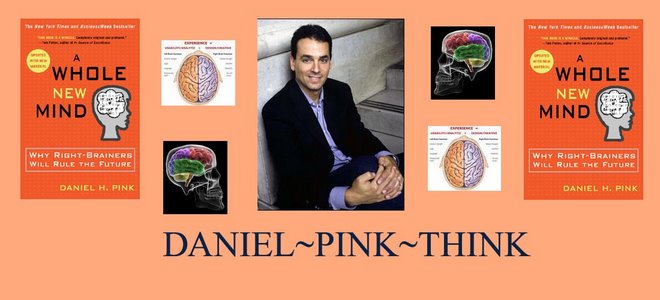Recap of the Sixth iRead meeting
on Daniel Pink’s book, A Whole New Mind,
Chapter Six: “Symphony”
Ted Rose, Cumberland University’s Dean of the School of Music and the Arts, led the discussion on ‘Symphony.” He said that this had a special significance to him because of a painting he remembers as a child with this title. Unlike a lot of art work he was exposed to, this one was full of patterns and shapes, non representational. It bothered him, but he also found it intriguing. Symphony is a lot of parts put together to create a whole. Like in drawing where objects are in relationships with each other. The group looked at the self portrait drawings that are in the book and discussed the differences between the two. We also examined drawings by Dean Rose of paper bags. He pointed out that people draw what they think they see and oversimplify shapes. We need to learn to see better and decipher tone, stroke, and line. He brought our attention to three types of marking systems: weight, edge and shade, as well as negative space. These tools can expand our capacity of expression. Most people need to be taught how to see.
Dean Rose also discussed how our educational system can stifle creativity. One example was when he was in the third grade and moved to another school, his teachers made him use his right hand (he was naturally left-handed). Although this made him dislike school, today he is ambidextrous and uses both hands to draw – as he demonstrated. He also told us about a fellow student who had become paralyzed from the neck down due to a sports accident. As part of his physical therapy, he had to learn to paint with his mouth, which he did successfully. Using his qualities of self discipline and perfectionism, he went on to a successful career in computers, something he never thought of doing before.
Dean Rose also told of a school he visited in Kuwait where the students learn through hands-on activities in small classes. There was much discussion about the limitations of our school systems and the obstacles to managing large classrooms. One method may be to use video gaming technology for educational purposes to engage students. We also pondered an excerpt from an article by Lorin Hollander warning that schools “are not nurturing our most precious resource: the creativity and humanity of our children.”
Next, the discussion led to an architectural project at Pratt Institute in New York where architects from all over the world explored building cities in the sky and other problem solving activities. These exercises changed their building designs and allowed them to think in a whole new way. We looked at pictures of the Dubai rotating skyscraper as an example of innovative architecture.
Dean Rose also spoke of a high school student he taught who was an honor student and a math whiz who was discouraged from taking art. When allowed into art class, he created a self portrait based on the style of Chuck Close. His favorite quote was from Einstein: “Imagination is more important than knowledge. For knowledge is limited to all we now know and understand, while imagination embraces the entire world, and all there ever will be to know and understand.”




No comments:
Post a Comment